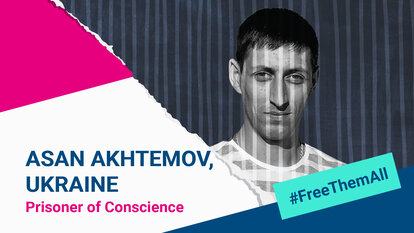Human Rights
Prisoner of Conscience: Asan Akhtemov, Ukraine

On September 3-4, 2021 Asan Akhtemov was arrested along with four other Crimean Tatars, including his brother Azis Akhtemov and Nariman Dzhelialov, the First Deputy Chairman of Mejlis of the Crimean Tatar people (the representative body of the Crimean Tatar people). Police also searched Akhtemov’s house and did not allow him to communicate with his lawyer for several days.
Russian authorities claimed that the three detainees had been paid $2,000 each to commit sabotage on a gas pipeline in Perevalne, Crimea on August 23. At the end of the year all three detainees were also charged with illegal trafficking of explosive devices. Shortly after the detention, a pro-Russian television channel aired a video of interrogations of Asan and Aziz Akhtemov, where both brothers made false confessions about their participation in the so-called sabotage ordered by the Main Intelligence Directorate of the Ministry of Defense of Ukraine and the Mejlis of the Crimean Tatar people. These ‘confessions’ were retracted as soon as the detainees gained access to the independent lawyers. It became known that Asan Akhtemov had been tortured by electroshock to coerce his confession to a crime he hadn’t committed.
In the meantime, Kyiv saw the arrests as another attempt to crack down on the Crimean Tatar people. Ukrainian president Volodymyr Zelensky was sure that the operation was connected with a recent launch of the Crimean Platform and a strive of Ukrainian state to put the topic of illegal annexation of Crimea back on the international agenda.
Following the arrests, Ukrainian First Deputy Minister of Foreign Affair of Ukraine Emine Dzheppar called the detention of Dzhelal and Aktemov brothers on the peninsula -“kidnapping and an act of political repression”.
"The sabotage affair is fabricated and they [investigators] are trying to force a confession from the Akhtemovs to implicate Nariman Dzhelyal," Dzheppar said, as quoted by Radio Free Europe. "There is reliable information that they are being tortured," she said without providing any details.
The detentions are one of the latest examples of escalating tension between Russian authorities in Crimea and the indigenous Crimean Tatar people. In the summer of 2021, a Russian-controlled court in Crimea sentenced Refat Chubarov, the Head of Mejlis of the Crimean Tatar people, which has been banned in April 2016, to six years in prison. The trial was held in absentia, as the defendant had already been forced to flee the Crimean peninsula. In May, Russia’s Supreme court upheld a sentence against Emir-Usein Kuku, a Crimean Tatar human rights defender who was found guilty of being a member of the Islamist political party Hizb ut-Tahrir, which is banned in Russia but not in Ukraine.
Crimean Tatars have been a subject of repression and harassment since Moscow took control over the peninsula in 2014, as Russian authorities try to silence any opposition. The indigenous people, which is critical of Moscow’s annexation of Crimea, was forced into exile during World War II, when Joseph Stalin deported them from their historical motherland.

Disclaimer: As of February 22, 2022, Asan Akhtemov is still in custody, awaiting trial.

Prisoners of Conscience from East and Southeast Europe
We feature select few prisoners of conscience out of the many in East and Southeast Europe. One political prisoner is one too many.
Find out who the other political prisoners are #PrisonersofConscience #FreeThemAll and in the special Focus on our website.